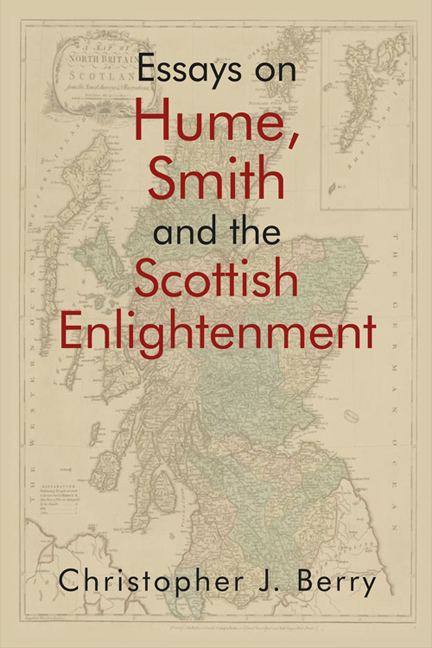17 - Smith and Science
Published online by Cambridge University Press: 06 May 2021
Summary
There is a deliberate ambiguity about the title of this chapter. It refers at one and the same time to Smith as a commentator on and as a practitioner of ‘science’. In the former role he explicitly addresses issues of method and implicitly reflects a pervasive Enlightenment commitment to the progressive agenda associated with science. In the latter role his actual investigations, if liberally interpreted, manifest both the method and the agenda.
The analysis that follows is divided into four parts. The first examines the ‘Enlightenment commitment’ – the high value placed on science – and notes what can be gleaned of Smith's own exposure to scientific thinking. Next, the focus is on Smith as a commentator, his specific account of science as the discovery of connecting principles. The third and longest part discusses ‘Smith the scientist’ – outlining and illustrating by means of a couple of case studies his commitment to causal explanation and to what I call ‘soft determinism’. In the brief final part the point will be made that Smith does not divorce scientific ‘findings’ from moral significance.
The Enlightenment was a self-conscious movement of intellectuals who thought of themselves as Aufklärer, striving to make their age un siècle des lumières. This implied that earlier times were comparatively benighted. This idea is encapsulated in the contrast between science on the one hand and ignorance, prejudice and superstition on the other. Any institutions such as slavery, torture, witchcraft or religious persecution that still existed were to be opposed as relics of darker ages, which the light of scientific reason would clear away. This Baconian implication, that science is to be put to use for the good of humanity, meant a unity of theory and practice.
Nowhere is this unity better exemplified than in one of the Enlightenment's key products, the Encyclopaedia or Rational Dictionary of Sciences, Arts and Professions (a text that Smith was instrumental in purchasing for Glasgow University Library). In its Preliminary Discourse (1751), D’Alembert (1963: 80ff.), after commending Bacon's path-breaking role, attached particular weight to the work of Newton. This is typical: Newton is the hero of the Enlightenment. His perceived achievement was to have explained the full range of natural phenomena, celestial as well as terrestrial, by utilising only a few simple principles (laws of motion plus gravity).
- Type
- Chapter
- Information
- Essays on Hume, Smith and the Scottish Enlightenment , pp. 303 - 325Publisher: Edinburgh University PressPrint publication year: 2018



